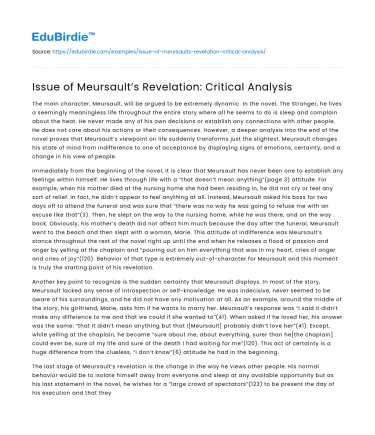The main character, Meursault, will be argued to be extremely dynamic. In the novel, The Stranger, he lives a seemingly meaningless life throughout the entire story where all he seems to do is sleep and complain about the heat. He never made any of his own decisions or establish any connections with other people. He does not care about his actions or their consequences. However, a deeper analysis into the end of the novel proves that Meursault’s viewpoint on life suddenly transforms just the slightest. Meursault changes his state of mind from indifference to one of acceptance by displaying signs of emotions, certainty, and a change in his view of people.
Immediately from the beginning of the novel, it is clear that Meursault has never been one to establish any feelings within himself. He lives through life with a “that doesn’t mean anything”(page 3) attitude. For example, when his mother died at the nursing home she had been residing in, he did not cry or feel any sort of relief. In fact, he didn’t appear to feel anything at all. Instead, Meursault asked his boss for two days off to attend the funeral and was sure that “there was no way he was going to refuse me with an excuse like that”(3). Then, he slept on the way to the nursing home, while he was there, and on the way back. Obviously, his mother’s death did not affect him much because the day after the funeral, Meursault went to the beach and then slept with a woman, Marie. This attitude of indifference was Meursault’s stance throughout the rest of the novel right up until the end when he releases a flood of passion and anger by yelling at the chaplain and “pouring out on him everything that was in my heart, cries of anger and cries of joy”(120). Behavior of that type is extremely out-of-character for Meursault and this moment is truly the starting point of his revelation.
Save your time!
We can take care of your essay
- Proper editing and formatting
- Free revision, title page, and bibliography
- Flexible prices and money-back guarantee
Another key point to recognize is the sudden certainty that Meursault displays. In most of the story, Meursault lacked any sense of introspection or self-knowledge. He was indecisive, never seemed to be aware of his surroundings, and he did not have any motivation at all. As an example, around the middle of the story, his girlfriend, Marie, asks him if he wants to marry her. Meursault’s response was “I said it didn’t make any difference to me and that we could if she wanted to”(41). When asked if he loved her, his answer was the same: “that it didn’t mean anything but that I[Meursault] probably didn’t love her”(41). Except, while yelling at the chaplain, he became “sure about me, about everything, surer than he[the chaplain] could ever be, sure of my life and sure of the death I had waiting for me”(120). This act of certainty is a huge difference from the clueless, “I don’t know”(6) attitude he had in the beginning.
The last stage of Meursault’s revelation is the change in the way he views other people. His normal behavior would be to isolate himself away from everyone and sleep at any available opportunity but as his last statement in the novel, he wishes for a “large crowd of spectators”(123) to be present the day of his execution and that they “greet me[Meursault] with cries of hate”(123). That is a significantly different mindset compared to his social isolation habits. Meursault went from believing that everyone’s purpose in life is to live until their death to wanting a crowd of those people to view his execution and pay him attention by greeting him with “cries of hate”(123). This newfound knowledge, awareness, and consciousness is an especially important development to Meursault’s character.
Meursault’s revelation may be extremely small and hard to notice but recognizing that he changed his state of mind from indifference to acceptance by displaying sudden signs of emotions, certainty, and a change in his view on people makes the revelation more clear. Throughout the novel, Meursault lived a meaningless life with no acknowledgment of feelings, self-knowledge, or human connection. He lives his life with a “that doesn’t mean anything”(3) mindset and without a deeper analysis of his actions, it is difficult to realize that there was any change in his state of mind at all. However, Meursault proved his revelation by yelling out his emotions at the chaplain, suddenly having a sense of certainty, and stepping out of his social isolation bubble with newfound awareness and consciousness. It may be an almost minuscule difference but Meursault’s mind opened up and that is the most important part of Meursault’s journey in life.






 Stuck on your essay?
Stuck on your essay?

